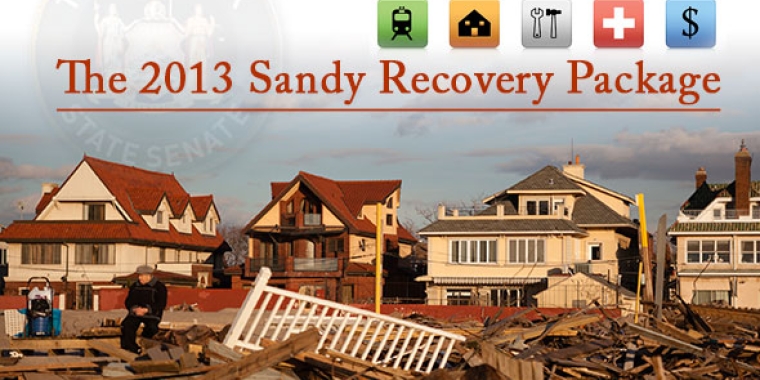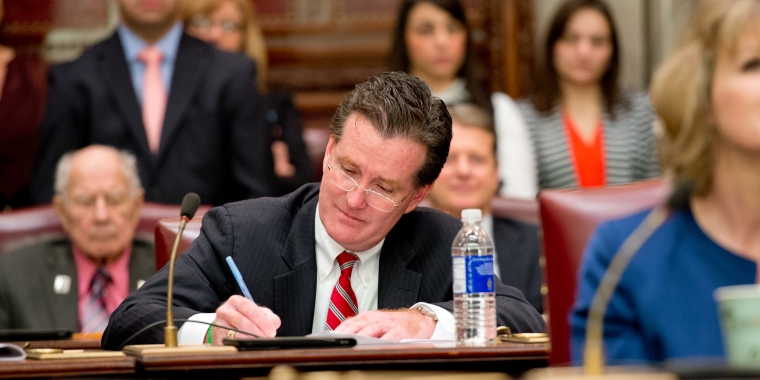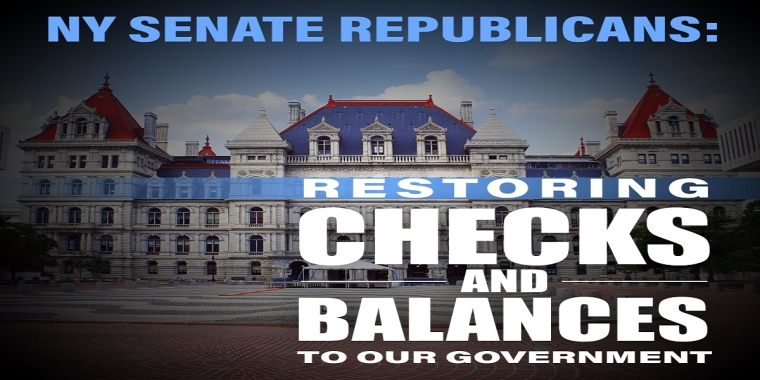
Senator Flanagan Supports Comprehensive Superstorm Sandy Package
John J. Flanagan
June 18, 2013
-
ISSUE:
- National Disasters

Senator John Flanagan (2nd Senate District) was joined by his colleagues in the New York State Senate in passing a comprehensive legislative package that provides relief to people and communities impacted by Hurricane Sandy, aids rebuilding efforts, and increases disaster preparedness. The legislation will be integral to providing needed financial assistance to homeowners, businesses, local governments, school districts, and others still recovering from the storm, and give those responsible for disaster response the tools they need to be more effective and efficient.
Senator Flanagan said: “Our state has always stood together in times of emergency and been there for each other when the need has arisen. With so many families in our state suffering from the after-effects of Superstorm Sandy, it is important that we help them in any way necessary. This package will provide these residents with much-needed assistance and continue our tradition of community that makes New York the great state it is.”
In New York, Hurricane Sandy caused 60 deaths and resulted in recovery costs of more than $30 billion. The areas with the most severe damage from the storm included New York City and the counties of Suffolk, Nassau, Westchester, and Rockland.
Senate Majority Coalition Co-Leader and Republican Conference Leader Dean G. Skelos said, “It has been over seven months since Hurricane Sandy left its mark, and as people and governments continue to rebuild, the Senate is implementing measures that will help make that process easier both now and in the future. Many members of the Senate have worked together to develop legislation that will provide effective relief to those who are impacted by Sandy and will help mitigate the effects of storms that have yet to come.”
Senate Majority Coalition Co-Leader and Independent Democratic Conference Leader Jeffrey D. Klein (D-Bronx/Westchester) said, “Eight months after Super Storm Sandy, it’s clear we need to equip our state with better tools to prepare and recover from the next natural disaster. Today, we took decisive action to bring relief and resources to the areas that need it most. I’m pleased that the Senate Task Force on Sandy Recovery worked diligently to address problem areas so that we can build an even more resilient New York.”
The bipartisan legislative agenda today includes bills sponsored by members from the Senate Republican, IDC and Democratic conferences. The measures include tax assessment relief for properties catastrophically damaged by the storm, revisions to regulatory obstacles that slow down the rebuilding process, and improvement and continued examination of state insurance laws to help policyholders receive funds following a disaster, among others.
Among the package of bills were two bills that Senator Flanagan cosponsored:
S2121A: Enacts the “Superstorm Sandy Assessment Relief Act” to allow eligible municipalities included in the federal disaster declarations (excluding New York City) to offer a real property tax reduction to owners whose properties suffered catastrophic damage during the storm.
S4554A: Provides a local option to counties within the Hurricane Sandy federal disaster area outside of New York City to grant exemptions for filing fees (or reimbursement of cost if fees have already been paid) associated with federal Small Business Administration Disaster Loans filed with the county clerk’s office.
The package also includes the following bills which Senator Flanagan supported in the Senate:
S5323A: Removes barriers to the efficient deployment of out-of-state restoration workers, such as utility and wireless network providers, to expedite the repair of infrastructure and utilities.
S2338A: Directs the special advisory panel on homeowner insurance/catastrophe coverage to study certain facets of insurance in coastal areas so that homeowners are able to continue accessing a variety of insurance products at affordable prices to cover their diverse insurance and protection needs in the wake of Superstorm Sandy.
S3850: Provides an incentive for business located in areas with varying levels of flood risk to obtain flood insurance by offering corporate franchise tax and personal income tax credits.
S4719: Expands the definition of “essential emergency vehicles and personnel” that are exempted from curfews and traffic prohibitions during declared emergencies to include personnel or vehicles of licensed or certified home health agencies or hospices. These individuals require such access in order to provide care and treatment to individuals in their homes or shelters during emergencies.
S4666: Provides for Superstorm Sandy Recovery Funds oversight by requiring the state Division of Budget to maintain a website that provides regularly updated information detailing how recovery monies are being spent.
S5787: Improves the state’s ability to coordinate, prepare, and respond to disaster emergencies by making technical updates to current emergency laws, allowing the state to accept certain non-monetary donations to assist with emergencies and helping to implement the NY-Text emergency alert system.
S4778B: Establishes an executive statewide plan for natural disaster emergency procedure that allows state and local officials to act cooperatively and efficiently in the event that the state is affected by extreme weather or other such natural disaster. It will also provide the public with a clear, concise, and effective set of guidelines for how to prepare for these types of disasters.
S5798: Requires the Department of Financial Services to conduct a study of anti-concurrent clauses in homeowners insurance policies with regards to sewer backup coverage. Many people affected by Superstorm Sandy found that anti-concurrent causation clauses in their policies prevented them from receiving coverage for property damage, especially damage to sewer lines. This bill will allow the Legislature to make an informed decision regarding the appropriate future treatment of these clauses in policies for sewer backup insurance coverage.
S3667A: Requires those performing mold assessment and mold remediation to be licensed by the state, helping to ensure the proper training by those addressing this public health issue.
S4725: Allows a municipality to have some flexibility in addressing Hurricane Sandy costs by repaying inter-fund advances made for Sandy-related expenses by the end of the next succeeding fiscal year. Current law requires municipalities to repay inter-fund advances by the close of the fiscal year in which the advance was made.
S4726: Authorizes local governments and school districts impacted by Hurricane Sandy to expend and temporarily transfer reserve funds for Sandy-related expenses. Any transfer made pursuant to this provision would be required to be reimbursed over a five-year period, starting with the fiscal year following the transfer, with at least 20 percent of the transferred funds reimbursed each year during the five-year period.
S5776: Permits Industrial Development Agencies (IDA) to include retail projects if a project is located within a county that has been declared a federal disaster area within 18 months of the project’s approval by the IDA and the project involves a business directly or indirectly impacted by the disaster.
S4729: Provides additional financing options to municipalities, school districts, and fire districts by giving them the authority to issue serial bonds to finance certain extraordinary expenses necessitated by Hurricane Sandy, similar to what was offered for communities impacted by Hurricane Irene/Tropical Storm Lee.
One piece of this package (S5407) was passed last week by the Senate and directs the state to examine, evaluate, and make recommendations about establishing an office of risk assessment and management. The risk manager would help anticipate, curtail, and minimize future state liabilities due to personal injury of its employees and the general public or the physical damage to property that occurs during the normal course of state operations or as a consequence of a natural disaster or catastrophic weather event.
In addition to the measures passed today, the 2013-14 state budget included several Superstorm Sandy related including: providing the appropriation authority to implement federal funding for Sandy recovery efforts; requiring gas stations to install generators or pre-wiring for generators; requiring the state to develop recommendations for the establishment of microgrids to assist in disaster relief and recovery; and providing the Public Service Commission with additional oversight and enforcement authority for certain electric utilities.



